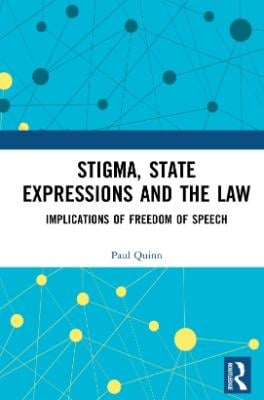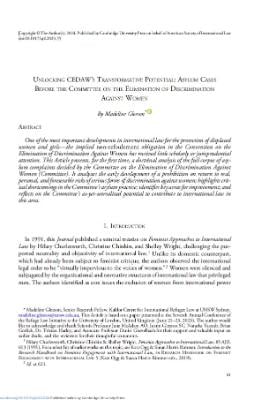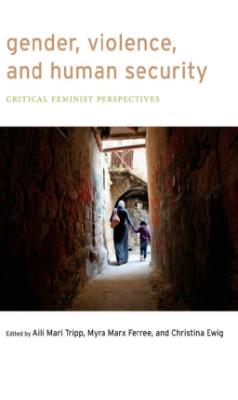
|
Stigma, state expressions and the law: Implications of freedom of speech
This book demonstrates the difficulties the law is likely to encounter in regulating the expressive activities of the state, particularly with regard to the stigmatization of vulnerable groups and minorities. Freedom of speech is indispensable to a democratic society, enabling it to operate with a healthy level of debate and discussion. Historically, legal scholars have underappreciated the power of stigmatization, instead focusing on anti-discrimination law, and the implicit assumption that the state is permitted to communicate freely with little fear of legal consequences. Whilst integral to a democratic society, the freedom of a state to express itself can however also be corrosive, allowing influential figures and organizations the possibility to stigmatize vulnerable groups within society. The book takes this idea and, uniquely weaving legal analysis with extant psychological and sociological research, shows that current legal approaches to stigmatization are limited. Starting with a deep insight into what constitutes state expressions and how they can become stigmatizing, the book then goes on to look into the capacity the law currently has to limit these expressions and asks even if it could, should it? This fascinating study of an increasingly topical subject will be of interest to any legal scholar working in the field of freedom of expression and discrimination law.
|

|
Unlocking CEDAW's transformative potential: Asylum cases before the Committee on the Elimination of Discrimination Against Women
One of the most important developments in international law for the protection of displaced women and girls—the implied non-refoulement obligation in the Convention on the Elimination of Discrimination Against Women has received little scholarly or jurisprudential attention. This Article presents, for the first time, a doctrinal analysis of the full corpus of asylum complaints decided by the Committee on the Elimination of Discrimination Against Women (Committee). It analyzes the early development of a prohibition on return to real, personal, and foreseeable risks of serious forms of discrimination against women; highlights critical shortcomings in the Committee's asylum practice; identifies key areas for improvement; and reflects on the Committee's as-yet-unrealized potential to contribute to international law in this area.
|
|
Los derechos humanos como brújula para guiar la puesta en marcha del fondo para pérdidas y daños
Esta información fue presentada por Amnistía Internacional y el Centro de Derecho Ambiental Internacional a la Conferencia de las Partes en la Convención Marco de las Naciones Unidas sobre el Cambio Climático (CMNUCC) el 15 de febrero de 2023, en respuesta al llamamiento a presentar opiniones sobre los temas y la estructura del segundo Diálogo de Glasgow y de los talleres mencionados en el documento FCCC/CP/2022/L.18–FCCC/PA/CMA/2022/L.20 (párrafo 7.a).
|
|
|
Detenciones arbitrarias en el marco del estado de excepción en El Salvador
De acuerdo con la información analizada, la mayoría de las más de 82,000 detenciones realizadas bajo el estado de excepción constituyen detenciones arbitrarias según el derecho internacional y los estándares desarrollados por el mismo WGAD. En muchos de estos casos no existe fundamento legal para la detención, en otros las personas detenidas están incomunicadas, y en algunos hay una negativa por parte de las autoridades penitenciaras a ejecutar órdenes de libertad emitidas por un juez o jueza. También se les considera detenciones arbitrarias ya que carecen de garantías al debido proceso, tales como la violación al principio de presunción de inocencia, el uso de la prisión preventiva de oficio y la violación al derecho a la defensa penal y a la igualdad de armas, entre otras.
|
|
|

|
Gender, violence, and human security: Critical feminist perspectives
The nature of human security is changing globally: interstate conflict and even intrastate conflict may be diminishing worldwide, yet threats to individuals and communities persist. Large-scale violence by formal and informal armed forces intersects with interpersonal and domestic forms of violence in mutually reinforcing ways. This book takes a critical look at notions of human security and violence through a feminist lens, drawing on both theoretical perspectives and empirical examinations through case studies from a variety of contexts around the globe. It goes beyond existing feminist international relations engagements with security studies to identify not only limitations of the human security approach, but also possible synergies between feminist and human security approaches. The chapters analyze specific case studies from around the globe, ranging from post-conflict security in Croatia to the relationship between state policy and gender-based crime in the United States. Shifting the focus of the term “human security” from its defensive emphasis to a more proactive notion of peace, the book ultimately calls for addressing the structural issues that give rise to violence. A hard-hitting critique of the ways in which global inequalities are often overlooked by human security theorists, the book presents a much-needed intervention into the study of power relations throughout the world.
|
|
|
Uncovering the nature of ECHR rights: An analytical and methodological framework
How does the European Court of Human Rights (ECtHR) understand the nature of human rights? The article develops a framework for the analysis of this question and shows how it can be applied. The first part identifies a gap at the intersection of doctrinal and philosophical approaches to human rights practice that leaves the ECtHR’s understanding of the nature of rights unaccounted for. The second part develops an analytic and methodological framework based on the idea of grounds, content and scope of human rights to bridge this disciplinary divide and facilitate a more perspicuous analysis of the Court’s conception of the nature of human rights. The third part tests this framework by examining the Court’s doctrines in relation to freedom of thought, conscience and religion and the right to free elections.
|
|
|
|
|